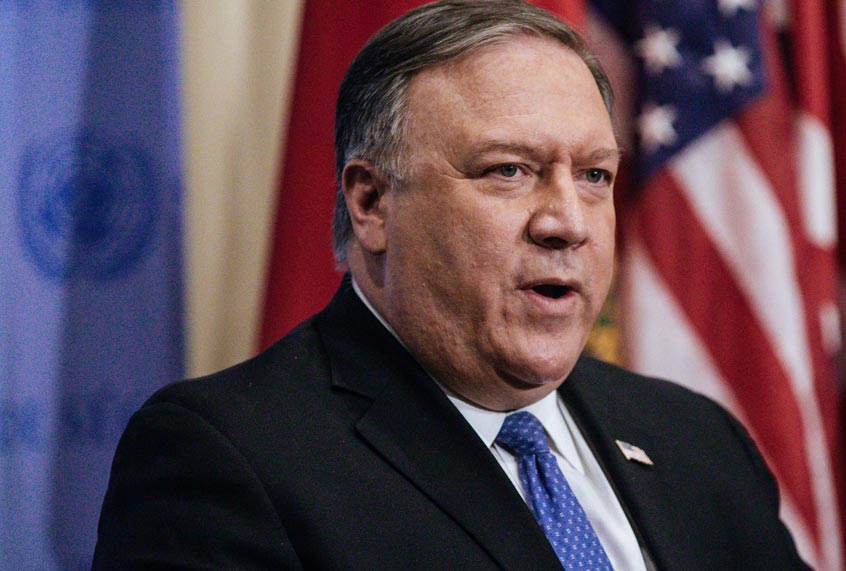President Donald Trump revealed on Wednesday afternoon that his administration would soon announce its response to aerial strikes on oil facilities in Saudi Arabia, an attack which the administration said was sponsored by Tehran.
“There are many options. There’s the ultimate option, and there are options a lot less than that,” Trump said while standing alongside his new national security adviser, Robert O’Brien. “We’ll see. Right now we’re in a very powerful position.”
Asked about what the “ultimate option” means, Trump said “war.” However, the president noted that he was “not talking about that ultimate option.”
Trump’s comments came less than an hour after Secretary of State Mike Pompeo called the weekend strike “an act of war” that was an “Iranian attack” on Saudi Arabia, while speaking to reporters before landing in the kingdom.
The secretary of state added that even if “fraudulent” claims of responsibility by Yemen’s Iranian-backed Houthi rebels were true, “it doesn’t change the fingerprints of the Ayatollah as having put at risk the global energy supply.”
Pompeo, who is traveling to meet with Saudi Crown Prince Mohammed bin Salman to discuss the recent attack, said the intelligence community has “high confidence” that the Houthis did not possess weapons similar to the ones used in the attacks, leading them to determine the attacks had not originated from Yemen. Meanwhile, Yemen’s Houthi rebels have claimed responsibility.
“As for how we know, the equipment used is unknown to be in the Houthi arsenal,” he said. “These line attack cruise missiles we have never seen there, and we think we’ve seen most everything.”
Saudi Arabia’s Defense Ministry said in a press conference Wednesday that they have evidence that the attack was “unquestionably” sponsored by Iran.
Earlier on Wednesday, Trump tweeted that he had directed Treasury Secretary Steven Mnuchin to “substantially increase Sanctions on the country of Iran!”
I have just instructed the Secretary of the Treasury to substantially increase Sanctions on the country of Iran!
— Donald J. Trump (@realDonaldTrump) September 18, 2019
Earlier, Iranian President Hassan Rouhani said Saudi Arabia should view the attack on its oil facilities this weekend as a warning to end the war in Yemen, where Saudi Arabia has fought the Houthi rebels since 2015, according to the Associated Press.
“The Yemeni people showed a reaction. They hit a location. They did not hit hospitals, so why are you upset? They did not hit schools. They did not hit the Sanaa bazaar. They attacked an industrial site to warn you,” Rouhani said. “Learn the lesson from the warning.
Saudi Energy Minister Prince Abdulaziz bin Salman announced Tuesday that Saudi oil production would be fully restored by the end of the month, reducing concerns about a major oil supply disruption after brent crude futures jumped nearly 20 percent on Monday.
Saudi Aramco President & CEO Amin Nasser said Tuesday that the synchronized attacks were timed to create “maximum damage” to Saudi facilities and operations. It was estimated the attack cut output by 5.7 million barrels of daily oil production, or more than 5 percent of the world’s supply.
Meanwhile, the path to a diplomatic solution to reduce the current tensions in the region further narrowed Tuesday when Iran’s Supreme Leader Ayatollah Ali Khamenei said no talks would take place between Iran and the U.S. “at any level.” Those remarks appeared to rule out all speculation about a potential face-to-face meeting between Trump and Rouhani at the annual session of the U.N. General Assembly next week in New York.
Khamenei tweeted Tuesday that if the U.S. “repents” and returns to the nuclear deal that it withdrew from last year, “then it can join and talk with Iran among other members of the deal.”
“Otherwise no negotiation will take place between Islamic Republic and U.S. officials at any level, whether in New York or anywhere else,” he added.
If U.S. repents & returns to #JCPOA it withdrew from, then it can join & talk with #Iran among other members of the deal. Otherwise no negotiation will take place between Islamic Republic& U.S. officials at any level, whether in New York or anywhere else.
— Khamenei.ir (@khamenei_ir) September 17, 2019
The 2015 Obama-era deal was originally agreed upon by Iran, China, France, Germany, Russia, the U.K. and the U.S.
Relations between the U.S. and Iran have steadily deteriorated after Trump’s abrupt decision to pull out of the Iran nuclear deal last year and re-impose sanctions on its oil exports.
Trump said Sunday that the U.S. was “locked and loaded” and ready to respond once it had consulted with Saudi Arabia and determined who was behind the attack.


